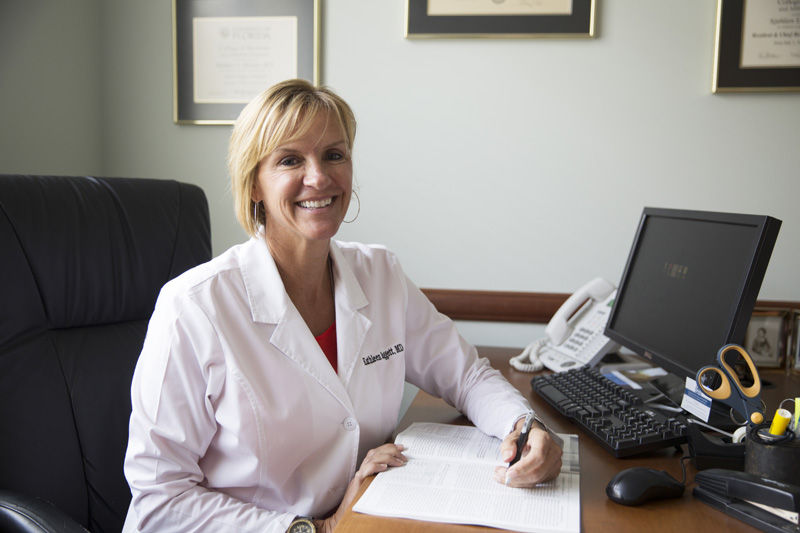Almost 20 percent of all American adults – or about 36 million people – suffer from some form of hearing loss according to the National Institutes of Health. Worse, a high percentage of those folks do not seek medical help until it’s too late. That’s true nationwide and here in Vero Beach.
It may come as a surprise to some, but we hear with our brains, not with our ears. When the audio signals our ears pick up – functioning like twin satellite dishes on either side of our heads – are disrupted, the brain has to work much harder to “fill in the gaps” and that extra effort can take its toll.
That knock at the door you’re not hearing? It could very well lead to something much worse than a missed visit with a friend.
“Hearing affects everything between your ears,” says Dr. Alexis Riley, audiologist at Vero ENT Associates.
The American Academy of Audiology now links untreated hearing loss to early-onset dementia and Alzheimer’s. NCOA – The National Council on the Aging – says people with hearing loss suffer “significant mental impairments” far sooner that those who have no hearing impairments at all or have been treated for their hearing loss.
According to NCOA’s chief executive officer, James Firman, “those with untreated hearing loss are more likely to report depression, anxiety and paranoia and are much less likely to participate in social activities.”
“Getting help as soon as a [hearing] problem is noticed is important,” explains Riley, “because when the brain is deprived of those auditory signals for too long, it’s harder to re-train your brain to hear again.”
Moreover, your hearing is as unique as your fingerprints. There is no “one-size-fits-all” solution to hearing loss.
Dr. Kathleen Baggett, a general and pediatric ear, nose and throat physician and partner at Vero ENT Associates, agrees and adds that, while there can be a variety of causes for hearing loss, early diagnosis and treatment is essential.
Signs of hearing loss may include a muffling of speech and other sounds; difficulty following a conversation or losing the train of that conversation to background noises; having trouble hearing consonants; frequently asking others to speak more slowly, clearly and loudly; needing to turn up the volume of the television or radio; withdrawing from conversations and the avoiding social settings.
NIH says there are two general categories of hearing loss. Sensorineural hearing loss occurs when there is damage to the inner ear or the auditory nerve. This type of hearing loss is usually permanent but can be mitigated with new, significantly updated hearing devices now on the market. Conductive hearing loss, meanwhile, occurs when sound waves cannot reach the inner ear. This can be caused by earwax build-up, fluid in the ear or a punctured eardrum. Medical treatment or surgery can usually restore conductive hearing loss.
Baggett also points out that middle ear fluid buildup can be a common ear problem, adding that it is “more common in children than adults.” In fact, she says, that’s part of why children are more prone to earaches than adults. “The shorter, flatter Eustachian tubes in children,” are more likely to cause problems than the longer, wider ones in adults.
Both Riley and Baggett emphasize the importance of getting a baseline-hearing test so changes in hearing can be accurately charted over time.
Baggett also muses about the old-fashioned stigma sometimes associated with hearing aids. “We all wear glasses,” she says, “and we don’t have any problems getting our readers out, yet everybody’s so afraid that wearing a hearing aid will make us look like an ‘old person.’”
It’s a prejudice Baggett says should be long gone given today’s technology and significantly smaller and better devices.
There is, however, a hitch in finding the right hearing device according to Baggett. The best hearing aids are expensive. She says, “A $500 hearing aid [probably] isn’t going to help a ‘sloping’ hearing loss. Maybe if you have a ‘flat’ hearing loss and only need an amplifier it might work, but 95 percent of people need something better.”
She suggests patients have an audiologist check their hearing device, regardless of how much it cost or where it came from, to “determine if it’s the right device for you and your hearing problem.” Often this is a no-charge or insurance-covered service.
There are other hearing-assistance devices besides hearing aids. Florida Telecommunications Relay, Inc., for example, is a non-profit distributor of amplified telephones for people with hearing loss. FTRI offers its phones at no cost to Indian River County residents, which is a wonderful service for some people. However, as Baggett points out, simply amplifying all sound frequencies (both high and low) may not solve a hearing problem.
If you or a loved one are showing signs of hearing loss, the best first call to make is probably to an ENT physician or doctor of audiology to find out what will work best for your or your loved one’s unique hearing needs.
Vero ENT Associates is located at 1325 36th Street, Suite A, Vero Beach, FL 32960. The phone number is 772-563-0015

